Progsheet - Ye Few Words With...Candice Night & Ritchie Blackmore
Ye Few Words With...Candice Night & Ritchie Blackmore
Interview & photos by scribe John Anthony Francis of Wilcox
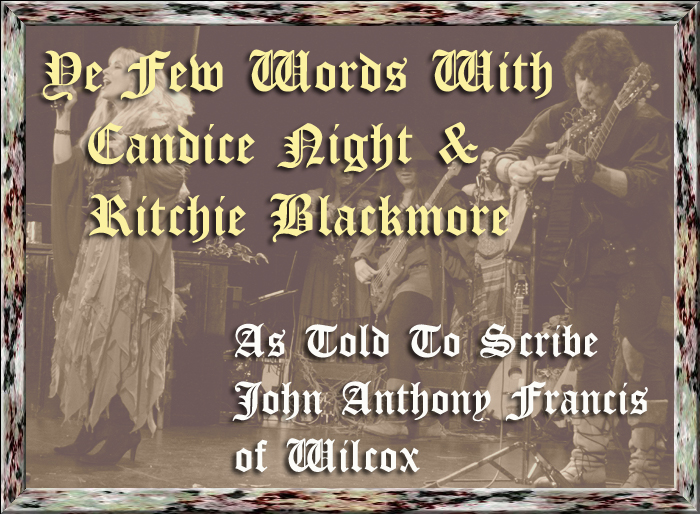
It's a shame that this is text and not audio. You're missing all the laughter. Talking with Candice Night in advance of a few east coast Blackmore's Night shows, Ritchie Blackmore decided to join the conversation. The two of them together banter back and forth, completing each others' thoughts, and filling the conversation with good natured humor. Pull up a seat and plant your tongue firmly in your cheek. Hoist a pint and listen in...
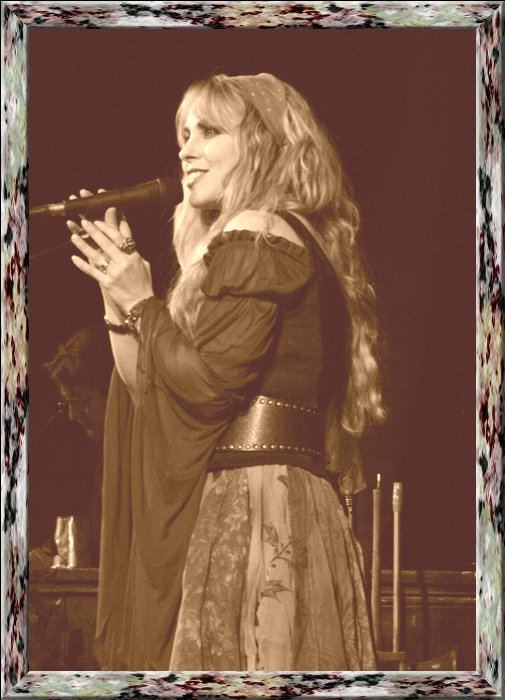
PS: When you look for musicians to play in Blackmore's Night, what are you looking for beyond a certain level of musical ability?
RB: With most bands, with my history being with Purple and Rainbow, if anybody joins they know there's lots of people that want to be in that type of band. With this project people are a little bit more reluctant. It's like "What are you playing? What are you doing?" It's a cross between renaissance rock music, folk ballads, and mystical music. I don't know too many bands that have done it. I can't think of any. You have purist bands that don't do the rock side. We try to do both. It's a very strange concoction sometimes. To me it's not.
It is tricky because sometimes we get people auditioning for the band and all they want to do is play rock and roll. We say "this is not what we're doing here." Then we get the other extreme. We'll have classical musicians who don't want to play any rock and roll. We always have that challenge.
CN: I feel like we have a long list of criteria when we audition people to be in the band. One of the things that really narrows down whoever's left is the fact that they can't only play one type of music. There's a lot of people out there that can play one type of music really, really well. That's the skill that they've honed. It's very rare to find someone who is versatile enough to be able to play Gypsy music, pop music, tavern music, renaissance music, rock music, and instrumental music. Really, that's the variety that we provide on stage and on our albums. It's harder to find people that have that versatility. Once you find those couple of people that are left standing - that can actually do that - you have to make sure that they've got a personality that will fit with the band. That they're willing to dress up. If it's a male - he's willing to wear tights and a renaissance shirt.
RB: Women's clothing.
CN: And the girls are willing to wear the corsets and just get involved in the fantasy aspect of it. The visual that we provide, that we live. Have the longer, kind of messy hair. We make everybody grow their hair as soon as they come into the band - you have to be willing to do that. And that they get along with everybody and have the schedule that works, too. We're not the type of band that goes out for a year at a time, and a lot of working musicians rely on that kind of income. We're at the point where we go out maybe for a month at a time - if that - a couple of times a year. It's a tricky balance and it really narrows down the playing field a lot for when people come to audition for the band and I think we basically take the one person who's left!
PS: When initially putting together Blackmore's Night, the two of you chose not to go the easier rock or pop route & decided to in effect pioneer a new genre. What led to that decision?
CN: I like to call us the most famous band you've never heard of. If you ask around, more people have heard of us, but they're not really sure why! I think when we first started doing this kind of music, we did it more for us. At that point Ritchie had been involved in the rock and roll industry for over 40 years. I think the reason he started playing this kind of music was because he was tapped out from where that whole industry was heading. He had done the incredible rock riffs. Played with and discovered the most amazing rock musicians and singers out there. After leaving Deep Purple in '93, he was almost forced back into doing Rainbow in '95 because it was something that he'd been so used to. The record company contract was there, that's what they expected, and that's what everybody expected from him. So it was a huge leap for him to actually do something so brave, where he followed his heart and did more renaissance and folk based music because that's not what he was known for for four decades. It was really brave for him to take this path. I think he had been so done with coming up with the riffs and doing the power thing for 40 years. Then seeing where the industry was, also. It was a totally different industry in the 90s than when he started. In the 60s, early 70s you could be an individual and really show your personality. You could turn on the radio and hear exactly who it was within the first couple of seconds. In the 90s record companies had become so corporation-run, and not artist-based. It was more money making for them, so they really wanted to control everything. They asked his band at that point to give demos, which he had never given in his entire life. They wanted to get involved with what the titles of songs should be. That's not what creativity is all about. At that point he said "I just want to play for me and follow my heart." We wrote all the songs on Shadow Of The Moon while he was recording Stranger In Us All with Rainbow. We wrote them while the other guys were doing their tracks. We were sitting in an old farmhouse in Massachusetts watching the snow come down, by a big blazing fireplace. He had the acoustic guitar and we would just create music for us. That's really where this entire project came from, was from his escape from the rock world.
RB: Although from my point of view I'd been into medieval music ever since 1972. David Munrow And The Early Music Consort Of London. I was obsessed with renaissance music. I always played rock and roll onstage yet when I went back to the hotel I'd listen to renaissance music. So, that was in my heart to play to begin with. I would always visit certain castles whenever we were in Europe. I'd always leave the band and go and stay in a castle, and they would go to a Holiday Inn or whatever they did. I would enjoy the ambiance and the history and the architecture of those castles. I'd often play to myself the type of renaissance music that they would be playing back in the 1500s.
Then I met another band from Germany called Des Geyers, and they were a truly historical purist type of renaissance band. I was so enthralled with their music. It just excited me so much. I suddenly realized that I had to get involved in that genre of music. I kept friends with them to this day. We're still friends. We play together. I since acquired these instruments like nickelharpes and shawms, mandolas, hurdy-gurdies. We play those on stage and at home as well. It opened up a whole exciting, refreshing new world for me compared to how I was in rock and roll in '94. I was becoming incredibly tired of just writing riffs and playing through a Marshall amplifier as loud as I could. That wears thin after 40 years. I'd kind of become bored with that. That's a brief explanation of what I went through. I'm still living in castles, dressing up in women's clothing - I mean renaissance clothing, and I just love to listen to medieval and renaissance music. That's my world. I'll still play the rock and roll on stage. I don't listen to rock music now. I still enjoy playing it now. Whereas back in '94, I was not enjoying playing it at all.
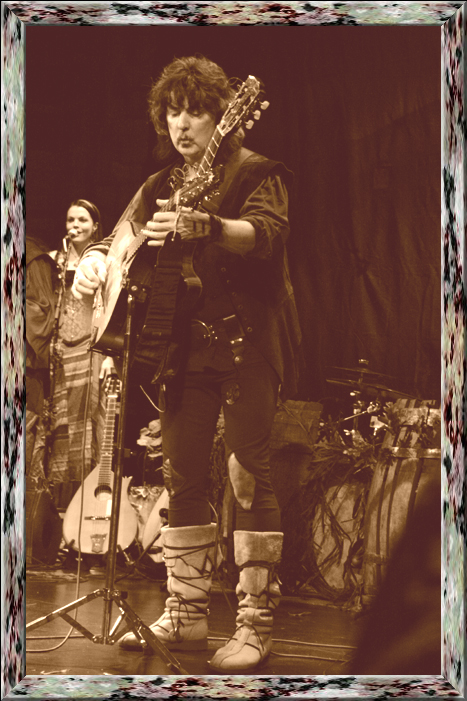
PS: Having seen you live over the years, I must say that your current playing is by far your finest.
RB: Thank you. I agree. I'm not just being facetious. I feel that I'm playing much better now than I did 25 years ago. I'm just not playing out and out rock for the masses. It just means that there's more for specialized interest type of people. More sophisticated, I suppose. It's more of a challenge. It can be very demanding and very difficult to play some of it. Very frustrating too, if you don't get it right. Whereas rock and roll is "hey, let's turn up and have a good time!"
PS: I imagine that playing to crowds under your own terms must be very satisfying.
RB:It is. It's amazingly satisfying because sometimes what we do halfway through the show we go into the rock style for about 20 minutes. Then, sometimes, the audience and the band are enjoying it so much playing acoustically - electric / acoustic - that I'm reluctant to even pick up the electric because I feel it's going to change the atmosphere of being in a tavern having a good time playing renaissance-inspired music.
CN: I feel like the audience is on a journey with us. When you come to a Blackmore's Night show and you're there because you've heard the music - you're not just there out of curiosity - although that's fine as well, obviously. You've come because you've been to shows before, you have the CDs, you've listened to the music, you know what's in store for you. I think they're open minded enough to want to go on that journey with you. I always feel like those type of people are the same like-minded people that we are. So we're all on the same journey. Nobody's there for criticism or ridicule. They're all just there to be open minded - the independent thinkers following something different. Something that they're not going to be programmed to listen to on the radio. I always feel like it's a sort of brainwashing when you hear the radio, because they play the same song 100 times in 10 minutes on every station. Before you know it, you know that song. Well, no wonder you know it, it's a constant repetition. For us, it's that people discover us and they find that they love what they're listening to. I don't think it's a big conundrum - I think it's just melodic music. I don't think it's that far out there - it's not Bjork. It's not Tori Amos - and they all obviously have these incredible followings as well. For me, when I listen to it, it's just pleasing, melodic music. Whether it's tavern or renaissance or just ballad - so many different genres - ok, but it's variety. I'd rather have that variety than not. Than just be stuck in 1 box always. I always feel like the fans that come to see our shows are so like-minded that they're just like friends that we haven't met yet, but we're all on the same page. It is incredibly rewarding and refreshing, but it's also the same thing as if you met somebody at a tavern or a bar or a library or wherever and you felt like you clicked and connected with them because they were from the same place you were, mentally. You both enjoy the same things. You're both on that same journey. For us, depending on where we're playing, between a couple of hundred and a couple of thousand people that feel that way. It's like just having friends out there at your shows.
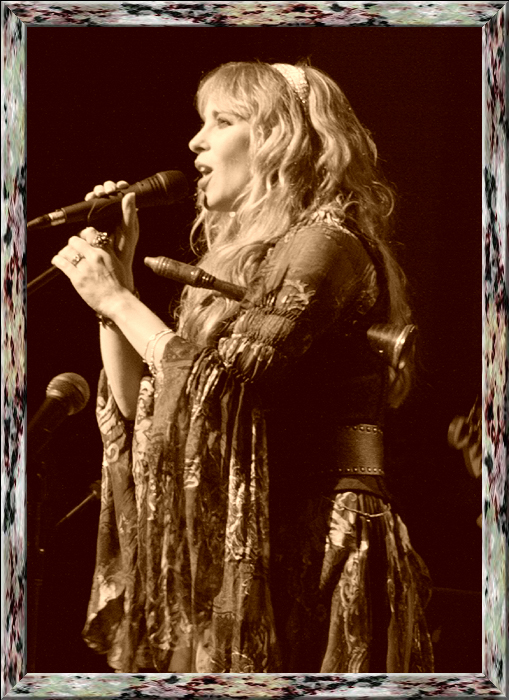
PS: When I see the band, there is very definitely an element of fun theatricality. Was that planned from the outset, or did it evolve organically over time?
RB: It naturally evolved. We weren't conscious of it at all. Candy can be very serious on stage when she's speaking, so I always tend to make fun of that kind of seriousness. There's this kind of rapport back and forth.
CN: I think that's just us.
RB: Yeah. It's just an off the cuff thing, really, which the audience seems to like. I remember going back and watching bands when I was 15 and I noticed that one of my favorite bands called Nero And The Gladiators, they used to dress up as gladiators. They would play classic rock tunes - Hall Of The Mountain King and all of these tunes. I noticed even at that age that they really broke the ice about the fourth number in when they did a comedy number. As soon as the audience can relate to you in a humorous way, you've got them. Everybody feels much more relieved and in a good mood. Some bands out there are so serious and they're so pompous, it's all a very stiff atmosphere. We try to relieve that tension by throwing a few jokes around, and it seems to work. It works for the band, too because obviously the band is a bit nervous about playing. The audience is not one way or the other. It's nice to relieve that tension, isn't it?
CN: Nothing is pre-planned. For us this is exactly the way we are at a dinner table if we were having conversations. We would be jabbing each other in a fun sort of way and making fun of things. I think that just translated to being on stage. Also, I find that when I do get nervous I tend to mock things a little bit more. I think that's my way of dealing with nerves sometimes. We're really lucky that the people that we have on stage - they're so funny. Sometimes I have to block my eyes from looking at Bard David because he's just so far gone out there. He will try to make me laugh at certain parts of different songs, so I have to turn my back on him so I don't see what he's doing and he knows it so then he tries twice as hard to make me laugh. When we get together I feel that it's just like summer camp. It's just like a group of buddies or friends or family just hanging out. And we're lucky to have really, really good people out there that are just so much fun to be with.
RB: He plays for the church so I think he's in a stiff atmosphere all the time. So he's just free as a bird when he's on stage with us, and then he goes back to church when we finish. We don't work all the time. I like to have a lot of time off. I like to look out of the window for long periods of time, and do nothing. Really jumping back to Purple days, that's one of the reasons that I left the band - there was so much work involved. We were touring all the time going to different places and I couldn't stand the traveling. I hear they're still doing it. They're still in Argentina to Australia to wherever. We tend to play America, to be home, and then go to Europe. Usually Germany or England and Czech - that's our favorite market. Then we come home and rest for a few months again. It's a great way to keep things fresh. We forget the act sometimes, we forget what we're playing, but that's all part of the joking around.
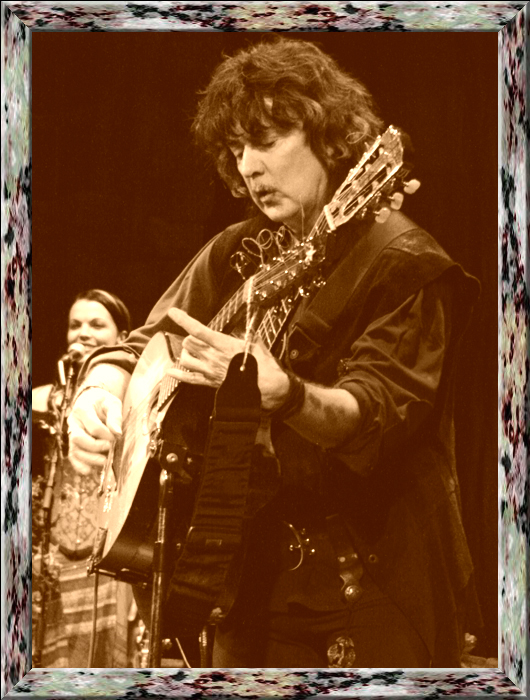
PS: I've never seen the band play the same set twice. Is that deliberate?
RB: It is in a way. What we do is the first 4 numbers we start with are usually the same.
CN: To warm us up.
RB: Once we're in the routine, then I just throw out songs that I think the audience would like. CN:Anything goes.
RB: Some audiences are very pensive and subdued, and they're thinking about what we're playing. Others want a party atmosphere, so I jump sometimes straight to the party songs, or go into the more sophisticated, more difficult tunes where they demand silence and listening to. We have about 35 songs to choose from, and I just have a list of those. I sometimes just play the first couple of notes, the opening notes of the song to give the band a cue as to what we're going to play. Sometimes they hate it because they don't know the song.
CN: Sometimes they leave the stage and we continue on to do a few songs. We change it not only due to the reaction or the vibe that you're getting from the fans, but also the venue. We play venues all around the world. Some of them are stone churches or stone castles, and they're going to be more conducive to quiet music. We'll tailor the setlist to be more acoustically based. We might do some songs that everybody knows as being rock songs but we'll do them in an acoustic fashion - otherwise you get that bounce back from the stone walls. There are a lot of different reasons why we change the setlist, but it's true - you'll never see the same show twice. I think that's another reason why so many fans follow us wherever we go. They actually take their vacation time and fly to wherever we're going to play because they know that they'll never see the same show twice.
RB: And we owe them money!
The East Coast May 2014 Blackmore's Night dates are:
May 20 - Alexandria, VA - Birchmere Music Hall
May 22 - Huntington, NY - Paramount Theater
May 24 - Ridgefield, CT - Ridgefield Playhouse
###
Table Of Contents
Contact





